Introducing Smart Contracts to Federated Learning: How Flock is Reshaping AI Production Relationships?
In the future, FLock also plans to launch a more user-friendly task initiation mechanism to realize the vision of "AI participation for everyone."
In the future, FLock also plans to launch a more user-friendly task initiation mechanism to realize the vision of "AI for Everyone."
Written by: LINDABELL
During the previous wave of decentralized AI, star projects such as Bittensor, io.net, and Olas quickly became industry leaders with their innovative technologies and forward-looking strategies. However, as the valuations of these established projects have soared, the entry barrier for ordinary investors has become increasingly high. So, in the face of the current sector rotation, are there still new opportunities to participate?
Flock: Decentralized AI Training and Verification Network
Flock is a decentralized AI model training and application platform that combines federated learning and blockchain technology to provide users with a secure environment for model training and management, while protecting data privacy and ensuring fair community participation. The term Flock first entered the public eye in 2022, when its founding team jointly published an academic paper titled "FLock: Defending malicious behaviors in federated learning with blockchain", proposing the idea of introducing blockchain into federated learning to defend against malicious behaviors. The paper explained how decentralized mechanisms can enhance data security and privacy protection during model training, and also revealed the potential of this new architecture in distributed computing.
After initial proof of concept, Flock launched the decentralized multi-agent AI network Flock Research in 2023. In Flock Research, each agent is a large language model (LLM) fine-tuned for a specific domain, capable of collaborating to provide users with insights from different fields. Subsequently, in mid-May 2024, Flock officially opened the testnet for its decentralized AI training platform, where users can participate in model training and fine-tuning using the test token FML and receive rewards. As of September 30, 2024, the number of daily active AI engineers on the Flock platform has exceeded 300, with over 15,000 models submitted cumulatively.
With the continued development of the project, Flock has also attracted attention from the capital markets. In March this year, Flock completed a $6 million funding round led by Lightspeed Faction and Tagus Capital, with participation from DCG, OKX Ventures, Inception Capital, and Volt Capital. Notably, Flock was the only AI infrastructure project to receive a grant in the 2024 Ethereum Foundation academic funding round.
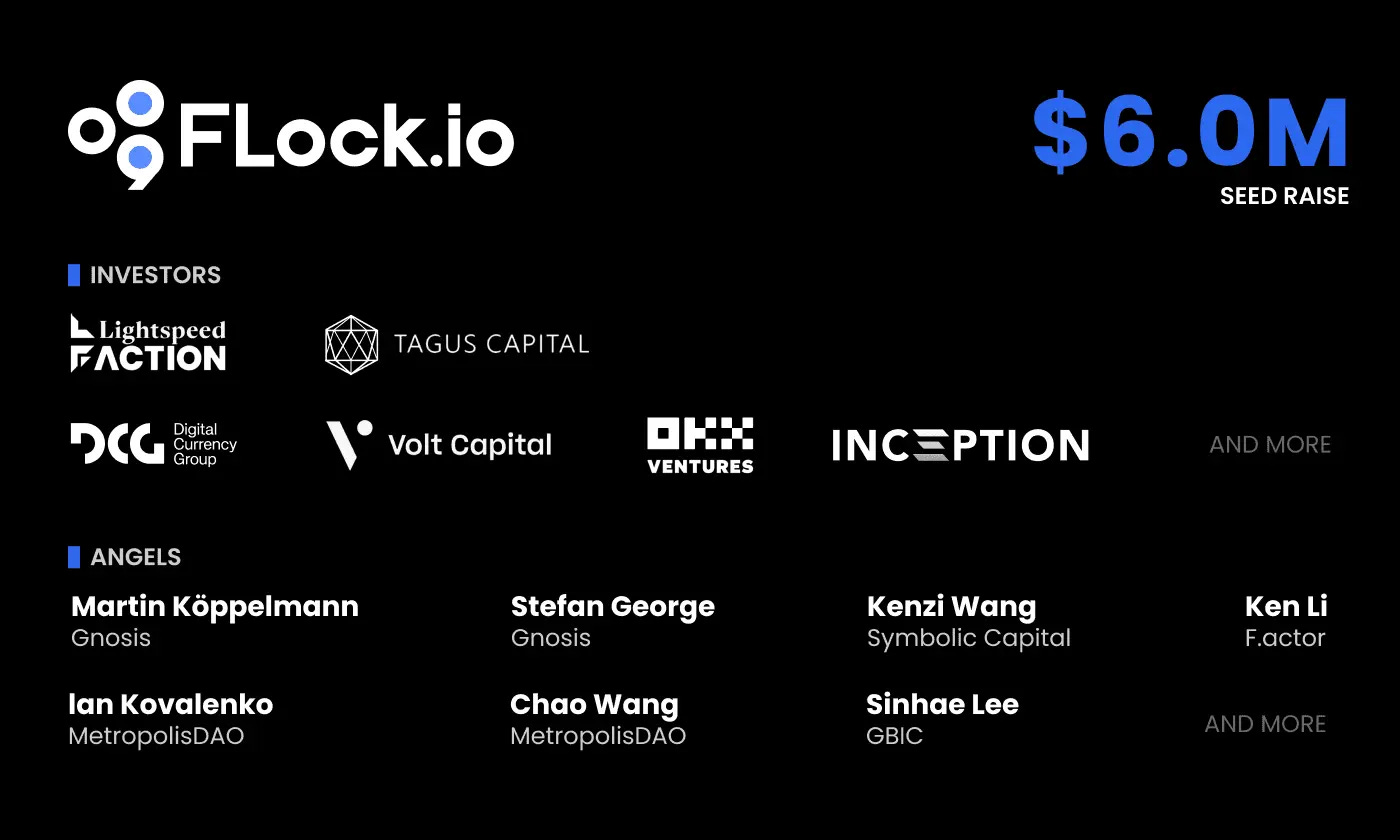
The Cornerstone of Reshaping AI Production Relations: Introducing Smart Contracts to Federated Learning
Federated Learning is a machine learning approach that allows multiple entities (usually called clients) to collaboratively train models while ensuring that data remains stored locally. Unlike traditional machine learning, federated learning avoids uploading all data to a central server, instead protecting user privacy through local computation. Currently, federated learning has already been applied in several real-world scenarios. For example, since 2017, Google has introduced federated learning into its Gboard input method to optimize input suggestions and text prediction, while ensuring that users' input data is not uploaded. Tesla has also applied similar technology in its autonomous driving system to locally enhance vehicles' environmental perception, reducing the need for massive video data transmission.
However, these applications still have some issues, especially regarding privacy and security. First, users need to trust a centralized third party. Second, during the transmission and aggregation of model parameters, it is necessary to prevent malicious nodes from uploading false data or malicious parameters, which could cause the model's overall performance to deviate or even output incorrect predictions. According to research published by the FLock team in the IEEE journal, the accuracy of traditional federated learning models drops to 96.3% when 10% of nodes are malicious, and when the proportion of malicious nodes increases to 30% and 40%, accuracy drops to 80.1% and 70.9%, respectively.
To solve these problems, Flock has introduced on-chain smart contracts as a "trust engine" in its federated learning architecture. As a trust engine, smart contracts can automate parameter collection and verification in a decentralized environment and publish model results impartially, effectively preventing malicious nodes from tampering with data. Compared to traditional federated learning solutions, even when 40% of nodes are malicious, FLock's model accuracy can still remain above 95.5%.
Positioning as the AI Execution Layer: Analyzing FLock's Three-Layer Architecture
A major pain point in the current AI field is that resources for AI model training and data usage are still highly concentrated in the hands of a few large companies, making it difficult for ordinary developers and users to effectively utilize these resources. As a result, users can only use pre-built standardized models and cannot customize them according to their own needs. This supply-demand mismatch means that even if the market has abundant computing power and data reserves, they cannot be transformed into practical models and applications.
To address this issue, Flock aims to become an effective scheduling system that coordinates demand, resources, computing power, and data. Drawing on the Web3 tech stack, Flock positions itself as the "execution layer," as its core function is to allocate users' customized AI needs to decentralized nodes for training and to schedule these tasks globally through smart contracts.
At the same time, to ensure fairness and efficiency throughout the ecosystem, the FLock system is also responsible for "settlement" and "consensus." Settlement refers to incentivizing and managing participants' contributions, rewarding or penalizing them based on task completion. Consensus is responsible for evaluating and optimizing the quality of training results, ensuring that the final generated model represents the global optimal solution.
The overall FLock product architecture consists of three main modules: AI Arena, FL Alliance, and AI Marketplace. AI Arena is responsible for decentralized basic model training, FL Alliance handles model fine-tuning under the smart contract mechanism, and AI Marketplace is the final model application market.
AI Arena: Localized Model Training and Verification Incentives
AI Arena is Flock's decentralized AI training platform. Users can participate by staking Flock testnet tokens (FML) and receive corresponding staking rewards. After users define the required model and submit the task, training nodes in AI Arena will use the given initial model architecture to train the model locally, without needing to upload data to a centralized server. After each node completes training, validators are responsible for evaluating the work of training nodes, checking the quality of the models, and scoring them. If you do not wish to participate in the validation process, you can also delegate tokens to validators to earn rewards.
In AI Arena, the reward mechanism for all roles depends on two core factors: the amount staked and task quality. The amount staked represents the participant's "commitment," while task quality measures their contribution. For example, the rewards for training nodes depend on the amount staked and the quality ranking of the submitted model, while validators' rewards depend on the consistency of their voting results with consensus, the amount of staked tokens, and the number and success rate of validations. Delegators' earnings depend on their chosen validator and the amount staked.
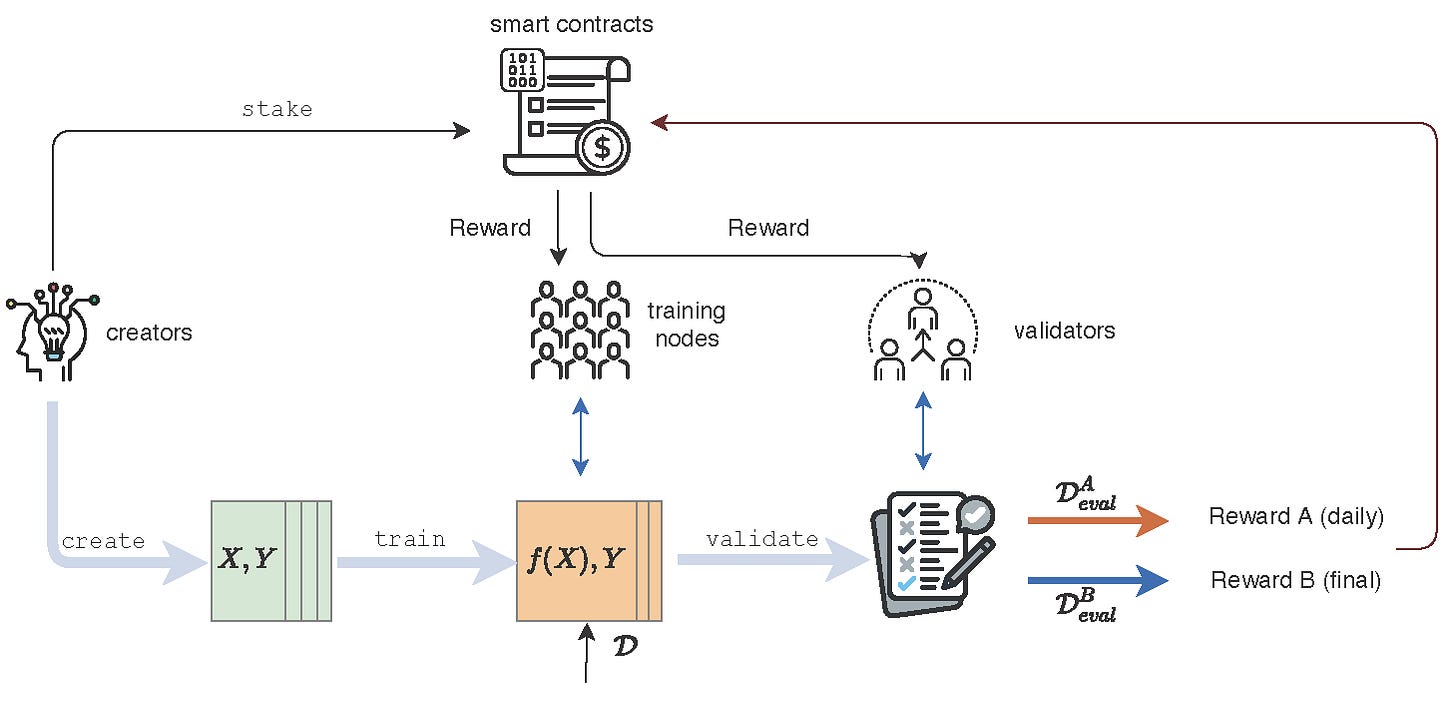
AI Arena supports traditional machine learning model training modes, and users can choose to use local or public data on their own devices for training to maximize the final model's performance. Currently, there are 496 active training nodes, 871 validator nodes, and 72 delegator users on the AI Arena public testnet. The current platform staking ratio is 97.74%, the average monthly return for training nodes is 40.57%, and for validator nodes is 24.70%.
FL Alliance: Smart Contract Automated Fine-Tuning Platform
The highest-rated models on AI Arena are selected as "consensus models" and assigned to FL Alliance for further fine-tuning. Fine-tuning goes through multiple rounds. At the start of each round, the system automatically creates an FL smart contract related to the task, which automatically manages task execution and rewards. Similarly, each participant needs to stake a certain amount of FML tokens. Participants are randomly assigned as proposers or voters. Proposers use their local datasets to train the model and upload the trained model parameters or weights to other participants. Voters then aggregate and vote to evaluate the proposers' model updates. All results are then submitted to the smart contract, which compares each round's score with the previous round to assess model performance improvement or decline. If the performance score improves, the system enters the next training phase; if the score declines, the previous round's validated model is used to start another round of training, aggregation, and evaluation.
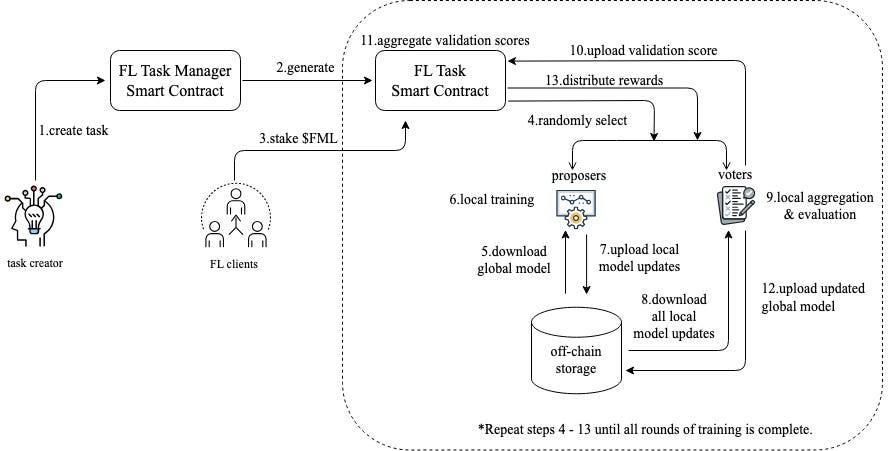
FL Alliance achieves the goal of multiple participants collaboratively training a global model while ensuring data sovereignty by combining federated learning and smart contract mechanisms. By integrating different data and aggregating weights, it can build a more performant and capable global model. In addition, participants demonstrate their commitment by staking tokens and receive rewards based on model quality and consensus results, forming a fair and transparent ecosystem.
AI Marketplace: How to Provide Personalized AI Services?
After being trained in AI Arena and fine-tuned in FL Alliance, models are finally deployed to the AI Marketplace for use by other applications. Unlike traditional "model marketplaces," AI Marketplace not only provides ready-made models but also allows users to further modify models and integrate new data sources to meet different application scenarios. In addition, AI Marketplace integrates RAG (Retrieval-Augmented Generation) technology to improve the accuracy of models in specific domains. RAG is a method that enhances large language models by retrieving relevant information from external knowledge bases during answer generation, ensuring more accurate and personalized responses.
Currently, the AI Marketplace has launched many customized GPT models for different application scenarios, including BTC GPT, Farcaster GPT, Scroll GPT, Ethereum GPT, and more. Let's take BTC GPT as an example to understand the difference between customized and general-purpose models.
In December 2023, when both BTC GPT and ChatGPT were asked "What is ARC20?":
- BTC GPT's answer: "The ARC20 protocol is a protocol built on the Bitcoin network that allows users to create, transfer, and upgrade digital items such as NFTs and fungible tokens. Through the ARC20 protocol, non-fungible NFTs and fungible tokens can be generated on the Bitcoin network. The main token of the ARC20 protocol is ATOM, which is used for various purposes within the protocol."
- ChatGPT's answer: "As of my last knowledge update in January 2022, there was no widely recognized standard or technology called ARC20 in technology, finance, or other common fields. It is possible that a new technology or standard named ARC20 has emerged since then, but I have no relevant information."
From the answers above, we can see the importance and advantages of customized GPT models. Unlike general-purpose language models, customized GPT models can provide more accurate answers by training on domain-specific data.
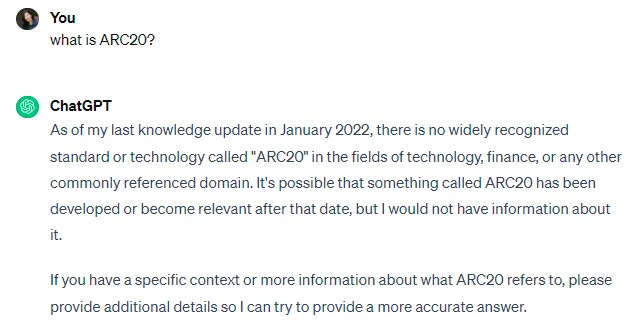

Both Supported by DCG: What Are the Similarities and Differences Between Flock and Bittensor?
With the AI sector heating up, the token of Bittensor, one of the representatives of decentralized AI projects, has surged more than 93.7% in the past 30 days, with its price approaching an all-time high and its total market cap once again surpassing $4 billions. Notably, Flock's investor DCG is also the largest validator and miner in the Bittensor ecosystem. According to informed sources, DCG holds about $100 millions worth of TAO, and in a 2021 "Business Insider" article, DCG investor Matthew Beck recommended Bittensor as one of the 53 most promising crypto startups.
Although both are supported by DCG, FLock and Bittensor have different focuses. In terms of positioning, Bittensor aims to build a decentralized AI internet, using "subnets" as the basic unit, with each subnet equivalent to a decentralized marketplace where participants can join as "miners" or "validators." Currently, there are 49 subnets in the Bittensor ecosystem, covering text-to-speech, content generation, LLM fine-tuning, and other fields.
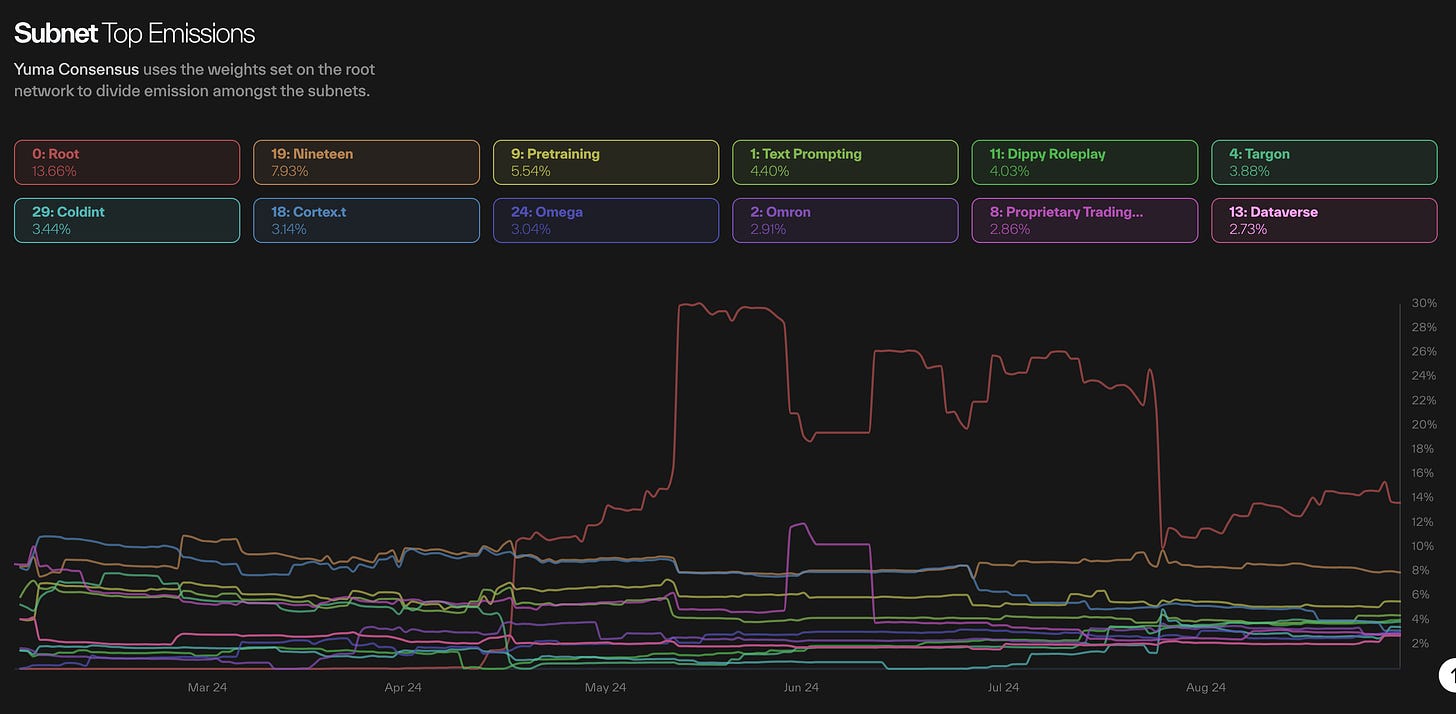
Since last year, Bittensor has been a market focus. On one hand, its token price has soared rapidly, from $80 in October 2023 to a peak of $730 this year. On the other hand, there have been various doubts, including whether its model of attracting developers through token incentives is sustainable. In addition, in the Bittensor ecosystem, the top three validators (Opentensor Foundation, Taostats & Corcel, Foundry) collectively stake nearly 40% of TAO, raising concerns about the degree of decentralization.
Unlike Bittensor, FLock is committed to providing users with personalized AI services by introducing blockchain into federated learning. Flock positions itself as the "Uber of AI," acting as a "decentralized scheduling system" that matches AI needs with developers. Through on-chain smart contracts, it automatically manages task allocation, result verification, and reward settlement, ensuring that each participant can participate fairly according to their contribution. However, similar to Bittensor, in addition to becoming a training node or validator, Flock also offers users the option to participate as delegators.
Specifically:
- Training nodes: Participate in AI task training competitions by staking tokens, suitable for users with computing power and AI development experience.
- Validators: Also need to stake tokens to participate in the network, responsible for verifying the quality of miners' models and influencing reward allocation by submitting validation scores.
- Delegators: Delegate tokens to miner and validator nodes to increase their weight in task allocation and share the rewards of the delegated nodes. In this way, even users without the technical ability to train or validate tasks can participate in the network and earn income.
FLock.io has now officially opened the delegator participation function. Any user can earn income by staking FML tokens and can choose the optimal node according to the expected annualized return rate to maximize their staking returns. Flock also stated that staking and related operations during the testnet phase will affect potential airdrop rewards after the mainnet launch in the future.
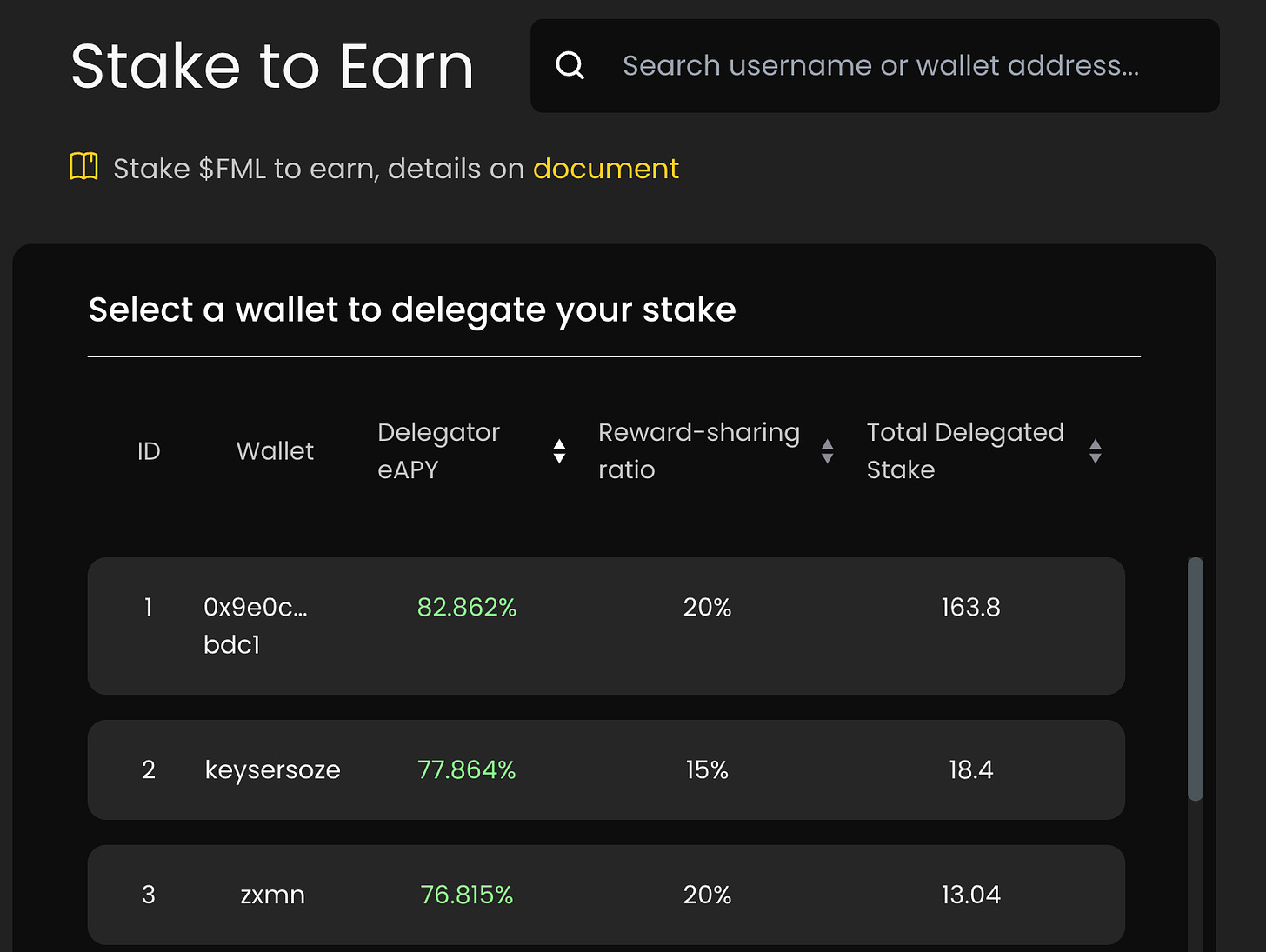
In the future, FLock also plans to launch a more user-friendly task initiation mechanism, allowing individuals without AI expertise to easily participate in the creation and training of AI models, realizing the vision of "AI for Everyone." At the same time, Flock is actively engaging in multi-faceted collaborations, such as developing on-chain credit scoring models with Request Finance, building trading bot models with Morpheus and Ritual, providing one-click deployment training node templates to enable developers to easily start and run model training on Akash. In addition, Flock has also trained a Move language programming assistant for Aptos developers.
Overall, although Bittensor and Flock differ in market positioning, both are trying to redefine production relations in the AI ecosystem through different decentralized technical architectures. Their common goal is to break the monopoly of centralized giants on AI resources and build a more open and fair AI ecosystem, which is exactly what the market urgently needs at present.
Disclaimer: The content of this article solely reflects the author's opinion and does not represent the platform in any capacity. This article is not intended to serve as a reference for making investment decisions.
You may also like
Alpen Labs Collaborates with Starknet to Develop Bitcoin DeFi Bridge for Enhanced Trust
Alpen Labs' 'Glock' Verifier to Bolster Starknet's Security as Execution Layer for Bitcoin Holders

Bitcoin Teetering on the Edge: A Black Friday Prelude?
Bitcoin's Price Plummets Below $112,000 Amid Global Market Tensions, Signaling Potential Short-Term Instability

Mt. Gox Repayment Triggers $544 Million Liquidation in Crypto Market
Bitcoin Tests $110K Support as Market Braces for Mt. Gox Creditor Repayments Amidst Surge in Crypto Liquidations

MicroStrategy Nears S&P 500 Entry After 70 Days of Qualification
